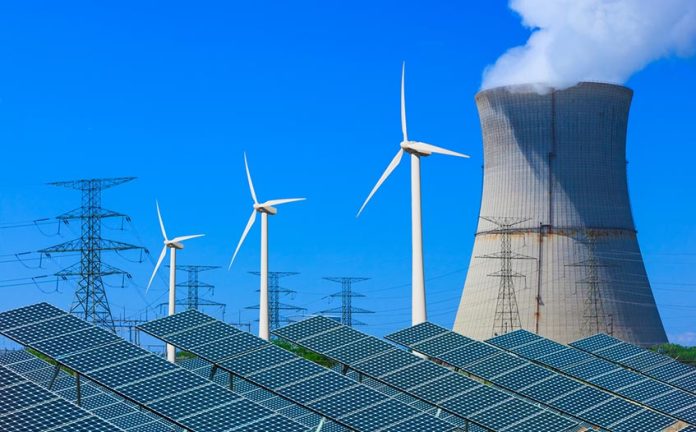In recent years, the United States has witnessed a renewed interest in nuclear energy, driven by the growing demand for clean electricity and energy security. As the need for reliable power sources escalates, particularly due to the rise of artificial intelligence and data centers, experts are advocating for nuclear power as a viable solution to fill the supply gap.
Richard Meserve, senior of counsel for Covington & Burling LLP and former chair of the Nuclear Regulatory Commission, highlighted the significant increase in electricity demand. He emphasized that nuclear power could play a crucial role in meeting these needs, especially as hyperscalers—large cloud service providers—emerge as potential long-term customers for nuclear energy.
At a recent National Academies workshop, experts discussed the evolving landscape of nuclear energy, focusing on investments in new technologies, regulatory challenges, and the importance of community engagement. Lucia Tian, head of Google’s advanced clean energy technologies unit, stated that incorporating nuclear energy into a diverse energy portfolio is essential for achieving net-zero carbon goals.
Despite the potential benefits, the construction of traditional nuclear power plants has often faced hurdles, including high costs and delays. The Department of Energy’s 2024 report indicates that the U.S. has constructed over 50 different reactor designs, complicating the industry’s ability to achieve cost efficiency through standardization.
Faraz Ahmad of Amazon emphasized the need for a shift in decision-making regarding nuclear investments. He pointed out that while nuclear power may not compare favorably with gas and coal in the short term, it is a much more prudent option when viewed as a long-term investment.
Duke Energy is exploring opportunities to repurpose coal sites for new nuclear projects, ensuring the continuity of infrastructure while retraining workers for emerging roles. Safety and security remain paramount, particularly with the introduction of advanced nuclear reactor designs, prompting discussions about the regulatory environment and community relations.
As the nuclear power industry evolves, the collaboration of various stakeholders—including bankers, utilities, developers, and local communities—will be essential. Building trust and fostering open communication among these groups is crucial for the successful deployment of new nuclear projects.
The future of nuclear energy in the U.S. appears promising, with significant investments and advancements on the horizon. As policymakers and industry leaders work together, nuclear power could play a pivotal role in meeting the nation’s energy demands while contributing to a sustainable future.
Lessons for Nigeria
Nigeria can learn several important lessons from the recent developments in the U.S. nuclear energy landscape:
- Diversification of Energy Sources: Just as the U.S. is integrating nuclear power into its energy portfolio, Nigeria can benefit from diversifying its energy sources to enhance energy security. This could involve exploring nuclear energy alongside renewables like solar and wind.
- Addressing Electricity Demand: With Nigeria’s growing energy needs, particularly from sectors like technology and manufacturing, adopting nuclear energy could provide a steady and reliable source of electricity, similar to the role it aims to fulfill in the U.S.
- Investment in Advanced Technologies: Learning from the U.S. focus on advanced nuclear technologies, Nigeria should consider investing in research and development of modern nuclear reactors, such as small modular reactors, which could be more cost-effective and easier to deploy in the Nigerian context.
- Regulatory Frameworks: Developing a robust regulatory framework, akin to the adjustments being made in the U.S. with the ADVANCE Act, can help ensure the safe deployment of nuclear facilities in Nigeria. This includes streamlining licensing processes while maintaining safety standards.
- Community Engagement: The importance of engaging local communities in the planning and deployment of energy projects is critical. Nigeria can learn from the U.S. experience to build trust and cooperation with communities that may host nuclear plants, addressing their concerns and involving them in decision-making.
- Long-Term Planning: Nigeria can benefit from adopting a long-term perspective on energy investments. Understanding that nuclear energy requires significant upfront investment but offers long-term benefits can guide strategic planning.
- Collaborative Approaches: Encouraging partnerships among various stakeholders—government, private sector, local communities, and international organizations—can enhance the feasibility of nuclear projects in Nigeria, similar to the collaborative efforts seen in the U.S.
Newspot Nigeria continuously seeks innovative solutions from around the world to address the challenges facing the nation. By sharing insights and lessons learned from global best practices, such as the advancements in nuclear energy, Newspot aims to empower Nigeria in making informed decisions about its energy future. This commitment to uncovering viable solutions is crucial as Nigeria works to meet the increasing demands for electricity and build a sustainable energy landscape.
By taking these lessons into account, Nigeria could make informed decisions about its energy future, potentially leveraging nuclear energy to meet its growing demands sustainably and securely.
Source: National Academy of Sciences
Share your story or advertise with us: Whatsapp: +2347068606071 Email: info@newspotng.com

















